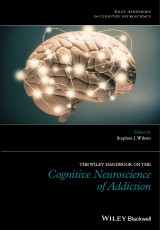Details

The Wiley Handbook on the Cognitive Neuroscience of Addiction
1. Aufl.
|
126,99 € |
|
| Verlag: | Wiley-Blackwell |
| Format: | |
| Veröffentl.: | 28.04.2015 |
| ISBN/EAN: | 9781118472439 |
| Sprache: | englisch |
| Anzahl Seiten: | 552 |
DRM-geschütztes eBook, Sie benötigen z.B. Adobe Digital Editions und eine Adobe ID zum Lesen.
Beschreibungen
<p>This volume provides a thorough and up-to-date synthesis of the expansive and highly influential literature from the last 30 years by bringing together contributions from leading authorities in the field, with emphasis placed on the most commonly investigated drugs of abuse.<br /><br /></p> <ul> <li>Emphasises the most commonly investigated drugs of abuse, including alcohol, cocaine, nicotine, and opiates</li> <li>Brings together the work of the leading authorities in all major areas of the field</li> <li>Provides novel coverage of cutting-edge methods for using cognitive neuroscience to advance the treatment of addiction, including real-time neurofeedback and brain stimulation methods</li> <li>Includes new material on emerging themes and future directions in the use of cognitive neuroscience to advance addiction science</li> </ul>
<p>List of Contributors viii</p> <p>Preface xii</p> <p><b>Section I Neurocognitive Mechanisms of Addiction 1</b></p> <p>1 Addiction as Maladaptive Learning, with a Focus on Habit Learning 3<br /><i>Theresa H. McKim and Charlotte A. Boettiger</i></p> <p>2 Neural Bases of Addiction?]Related Impairments in Response Inhibition 29<br /><i>Hugh Garavan, Alexandra S. Potter, Katie L. Brennan, and John J. Foxe</i></p> <p>3 Working Memory Functioning and Addictive Behavior: Insights from Cognitive Neuroscience 55<br /><i>Travis T. Nichols and Stephen J. Wilson</i></p> <p><b>Section II Neurocognitive Mechanisms of Addiction: Reward, Motivation, and Decision Making 77</b></p> <p>4 Behavioral and Brain Response to Non?]Drug Rewards in Substance Abuse: Implications for Motivational Theories of Addiction 79<br /><i>James M. Bjork</i></p> <p>5 Role of the Value Circuit in Addiction and Addiction Treatment 109<br /><i>Anna B. Konova and Rita Z. Goldstein</i></p> <p>6 The Insula: A Critical Neural Substrate for Drug Seeking under Conflict and Risk 128<br /><i>Nasir H. Naqvi and Antoine Bechara</i></p> <p>7 Addiction as a Symptom of Failure Modes in the Machineries of Decision Making 151<br /><i>A. David Redish</i></p> <p><b>Section III Neurocognitive Mechanisms of Addiction 173</b></p> <p>8 The Role of Sensory and Motor Brain Regions in Drug?]Cue Reactivity 175<br /><i>Yavor Yalachkov, Jochen Kaiser, and Marcus J. Naumer</i></p> <p>9 Neural Mechanisms Underlying Craving and the Regulation of Craving 195<br /><i>Hedy Kober and Maggie Mae Mell</i></p> <p>10 Neurobiology of Alcohol Craving and Relapse Prediction: Implications for Diagnosis and Treatment 219<br /><i>Corinde E. Wiers and Andreas Heinz</i></p> <p>11 Neural Mechanisms Associated with Stress?]Induced Drug Craving 240<br /><i>Verica Milivojevic, Helen C. Fox, and Rajita Sinha</i></p> <p><b>Section IV Cognitive Neuroscience and the Development of Addiction 267</b></p> <p>12 Neurological Risk Factors for the Development of Problematic Substance Use 269<br /><i>Sylia Wilson, Kathleen M. Thomas, and William G. Iacono</i></p> <p>13 Adolescence and Addiction : Vulnerability, Opportunity, and the Role of Brain Development 292<br /><i>David M. Lydon, Adriana Galván, and Charles F. Geier</i></p> <p>14 Neurocognition and Brain Abnormalities among Adolescent Alcohol and Drug Users 311<br /><i>Anita Cservenka and Bonnie J. Nagel</i></p> <p><b>Section V Cognitive Neuroscience and the Treatment of Drug Addiction 333</b></p> <p>15 The Neurocognitive Mechanisms Underlying Psychosocial Interventions for Addiction: Motivational Interviewing as a Case Study 335<br /><i>Sarah W. Feldstein Ewing and Jon M. Houck</i></p> <p>16 Brain Stimulation as a Novel Technique for Craving Management and the Treatment of Addiction 357<br /><i>Aviad Hadar and Abraham Zangen</i></p> <p>17 Development of Real?]Time fMRI Neurofeedback for Craving in Nicotine?]Dependent Cigarette Smokers 390<br /><i>Karen J. Hartwell, Kathleen T. Brady, and Mark S. George</i></p> <p><b>Section VI Emerging Themes and Future Directions 405</b></p> <p>18 Advancing Addiction Research through the Integration of Genetics and Neuroimaging 407<br /><i>Hollis C. Karoly, Sarah L. Hagerty, Barbara J. Weiland, and Kent E. Hutchison</i></p> <p>19 Neuroeconomic Perspectives on the Potent but Inconsistent Motivations Characteristic of Addiction 440<br /><i>A. James Melrose, Eustace Hsu and John Monterosso</i></p> <p>20 Beyond Functional Localization: Advancing the Understanding of Addiction-Related Processes by Examining Brain Connectivity 472<br /><i>Matthew T. Sutherland, Xia Liang, Yihong Yang and Elliot A. Stein</i></p> <p>21 Functional Neural Predictors of Addiction Outcomes 503<br /><i>Elliot T. Berkman</i></p> <p>Index 527</p>
<b>Stephen Wilson</b> is currently an Assistant Professor of Psychology at the Pennsylvania State University, USA where he is affiliated with the Center for Brain, Behavior, and Cognition. Dr. Wilson’s primary area of research interest is addictive behavior, with a focus on cigarette smoking. He uses interdisciplinary approach that integrates theory and methods from traditional behavioral addiction research with those derived from the affective, cognitive and social neurosciences. His research has been supported by the National Institute on Drug Abuse, the National Cancer Institute, and the Eunice Kennedy Shriver National Institute of Child Health and Human Development.
Drug abuse and addiction are major societal problems, with annual economic costs that exceed $600 billion in the United States alone. The application of theory and methods from cognitive neuroscience has become increasingly important in the effort to better understand the mechanisms that contribute to the development and maintenance of addictive behavior. In addition, cognitive neuroscience techniques are proving highly valuable for research aimed at developing strategies to prevent and treat drug addiction. This volume provides a comprehensive, up-to-date synthesis of this expansive and highly influential literature by bringing together contributions from leading authorities in the field.<br /><br />The book is divided into six sections that span the breadth of the cognitive neuroscience of addiction; these include an inclusive review of current research and theory in all major conceptual and methodological domains of inquiry, and a synopsis of cutting-edge emerging themes and new directions that will shape the future of the study of drug addiction from the perspective of cognitive neuroscience. The book will serve as an accessible and thorough resource for researchers, graduate-level and postdoctoral trainees, and clinical practitioners who are interested in the study and treatment of drug addiction.
Diese Produkte könnten Sie auch interessieren:

The Wiley-Blackwell Handbook of Childhood Social Development

von: Peter K. Smith, Craig H. Hart

136,99 €

The Wiley-Blackwell Handbook of Childhood Social Development

von: Peter K. Smith, Craig H. Hart

28,99 €














